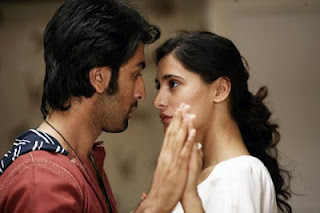 Laalchee (“greed”) sounds like a fable. If you search for “laalchee” on Google, as I did, you’ll come up with YouTube videos for this film, and also for several versions of the Aesop-ish Hindi story “Laalchee Kutta” (“The Greedy Dog”). So I was expecting, if not in-depth characterizations, then at least moral clarity.
Laalchee (“greed”) sounds like a fable. If you search for “laalchee” on Google, as I did, you’ll come up with YouTube videos for this film, and also for several versions of the Aesop-ish Hindi story “Laalchee Kutta” (“The Greedy Dog”). So I was expecting, if not in-depth characterizations, then at least moral clarity.So who can tell me the moral of this story? Anyone? Anyone?
Is it that being rich means that you can be any damn thing you please, including a leering old lech or a puppetmaster who makes the less wealthy dance for your amusement?
Is it that excesses of money make you treat women like personal playthings, even if they’re not interested in you?
Is it that being rich means that people assume you know what you're doing?
 |
| Pran's haveli, or a reasonable approximation thereof. |
His four younger brothers and four sisters-in-law come to care for the ailing kazillionaire, but he pines for his missing nephew Amar, whose father—another brother—went off in a huff fifteen years earlier, apparently because he didn’t approve of Pran’s shenanigans with the ladies. The brothers and bhabhis surround the lonely invalid with chatter and children, planning picnics and doing what seems like a pretty good job of filling his empty mansion and life. Then along comes the sexy Kamini, a nurse much given to halter tops and short skirts (well is she nicknamed “Mini”). And seeing that she’s sleeping in his room, that he’s spending ungodly amounts of dough on clothes that consist of little actual cloth, and that he’s dropping broad hints about marriage, the family members begin to worry about whether there will be any inheritance left for them.
Can you really blame them? You don’t have to be motivated by greed to think that perhaps your older brother has…slipped a bit when he’s spending all his time and money on a permed bimbo who pouts and coos and does the sexy-dance [1990s Bollywood version] in the old man’s room at night while the younger brothers spy through the window.
It’s just not dignified. I don’t know what I would do if my big brother began to behave this way*, but I hope I would try to talk some sense into him.
So naturally what the family members do is this: they hire an actor (a well-scrubbed, smiling Rohit Roy) to impersonate the lost and much-missed Amar. And Faux-Amar takes the job and runs with it so effectively that soon Pran is handing him suitcases of money, forgiving and blessing even when the actor is caught red-handed trying to sell the gold chain he swiped from Pran’s bedside table.
I had moments of enjoyment, even moments of surprise, when I thought to myself: How will this character, who I know must be the good guy in the end, overcome our distaste at what is patently not good behavior? Is the filmmaker actually going to create a complex character, a real person with real shades of gray?
Sadly, the answer is no. The key to the metamorphosis is that the scriptwriters (Anil Kalelkar and Anand Vardhan, who seem to have disappeared without a trace) just let the cardboard Good Girlfriend (Karina Grover, but really, who cares)—the one Faux-Amar is saving up to marry—act as a sort of external conscience. She shames the lazy, manipulative, greedy chor into becoming the morally upright boy that his sweet smile and effortless charm have destined him to be. Yawn. And ultimately, Faux-Amar doesn’t have to be a good guy from the get-go; he just has to reach good-guy status before the brothers-and-bhabhis do.
And that turns out to be a ridiculously easy task. Pran reveals that he’s revising his will to give Amar a share, and everyone goes bonkers. Then the scheming Mini, who has been tossed from the house because Faux-Amar noticed that she had a boyfriend on the side, presents a mystery document to Pran. Pran’s lawyer nods grimly and explains that Mini and her beau now control the money, the business, and the Embassy Suites. Yes, just because. Now Pran is penniless! But he can stay with his family, right? No, because then they all line up to tell him that they never liked him anyway and that if there’s no inheritance, then to them he is nothing, nothing!
 |
| A much better movie than Laalchee. |
Oh, wait—it’s all a ruse. Like Faux-Amar, Mini is also a hireling, brought on board by Pran to prove his suspicions about his family’s greed. You’ll be relieved to know that Pran is still rich. (He doesn’t even need the prop wheelchair any longer.) And Faux-Amar’s reserves of goodness, which once revealed prove to be clear and deep and true, mean that he deserves to end up owning the Suites. And so he does.
 |
| Amar before Pran loves him. |
Maybe I should give the screenwriters more credit for their exceptionally apt prediction of the 2012 Republican field. But the inter-familial tribulations of the super-rich were no more interesting in 1997 than they have been since. Let's hope that we don't have to pretend to be the long-lost nephew of a rich guy to start feeling real compassion for one another.
*Which my brother would not; this would strike him as just as much of an affront to his dignity as drinking a can of Bud Lite—and he has informed me that if I ever see him doing that, I should know that he has been kidnapped and is signalling desperately for help.













